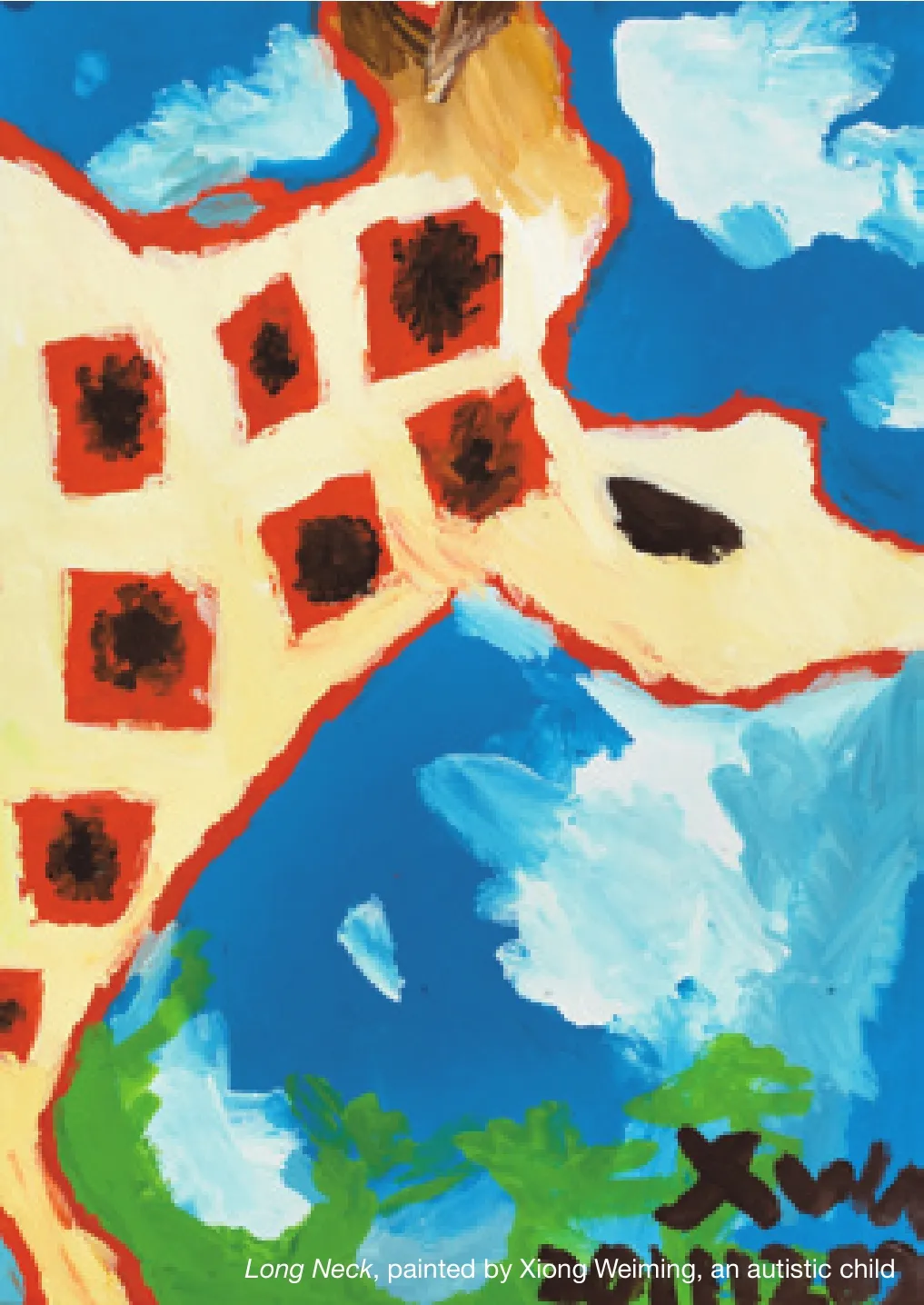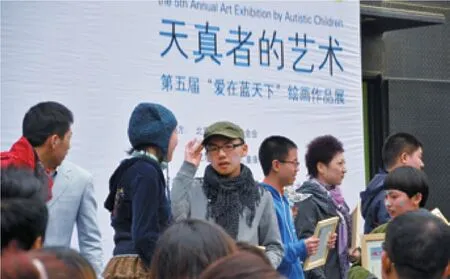The Silence Of the Kids
2012-10-14RaisingawarenesstocareforandsupportautisticchildrenByLiFangfang
Raising awareness to care for and support autistic children By Li Fangfang
The Silence Of the Kids
Raising awareness to care for and support autistic children By Li Fangfang

COURTESY OF INSIDE-OUT ART MUSEUM
At the age of 3, Xiao Jingkang, always known as Kangkang, was supposed to attend kindergarten in Beijing, but he couldn’t, because he didn’t talk—not to his friends,not to his teachers, not even to his parents. Kangkang was diagnosed with moderate-to-acute autism and unable to communicate with people. He also suffers from severe mood swings.
“I couldn’t help crying when I heard the result. My whole world collapsed,” said his mother Zou Wen when recalling the day 11 years ago.
Despite a short battle with depression, Zou and her husband pulled themselves together and did their best to provide for Kangkang.They sent Kangkang to training centers for autistic children, which taught the kids how to speak, paint,swim, and sing.
Today, Kangkang is 14. He can draw, swim and even cook for his parents. He’s still a bit nervous when meeting new people, but he’s never impolite. His paintings have been exhibited at the opening ceremony of an art studio, founded by Li Hua, who has been a volunteer working with autistic children for three years.Li is a member of the Beijing Association for Rehabilitation of Autistic Children (BARAC),a social organization aiming to provide care and support for autistic families.
Generally, autistic children beginning therapy before the age of 3 make noticeable progress, according to Jia Meixiang, a psychiatrist from the Institute of Mental Health of Peking University and an expert on autism.
“Parents must face the reality and get rid of negative emotions as soon as possible. Their timely scienti fi c help will alleviate children’s autistic symptoms,” Jia said.
Kangkang entered an elementary school in Beijing. Thanks to the protection and understanding of the teachers and classmates,the boy began having a social life and is getting better.
Social awareness
Children with autism typically exhibit impaired social interaction abilities marked by repetitive behaviors and narrow interests.Many of them cannot express their feelings through language or control their emotions.However, some are talented in and enthusiastic about music, fi ne arts and mathematics.
On April 8 at the Inside-Out Art Museum in Beijing, artists, parents and instructors of autistic children shared their thoughts on education. The museum has held a series of charity activities for artistically talented autistic kids. Prior to the seminar, altogether 27 young painters with autism exhibited 451 artistic works in the museum. Many visitors said they had never thought the mind of the autistic children can be so beautiful.
“Their works are amazing,”said Chen Danqing, a famous oil painter. Because they are unwilling to communicate with others, these kids totally focus on their inner feelings without disturbance from the external world. They can not only draw but also tell their own stories in this artistic way.
During the seminar, Yang Hongtao, an experienced instructor from north China’s Inner Mongolia Autonomous Region shared her method of teaching autistic children how to draw.
Like other art teachers, she initially taught kids technical drawing skills. But it seemed the students were stuck in a certain level and had no creative thinking when they became older.
Occasionally, she noticed a student named Zhu Wanjun coloring grasslands gray and asked why. “Because they are roasted to death in the sun,” the child replied.
Yang became aware that her students tended to weave their feelings into their drawings. Then she guided them to feel things first by touching, smelling or tasting, before putting their emotions on paper.
“People may fi nd it hard to interact with autistic people and tend to ignore their feelings. But this group of people with special needs have passionate feelings deep down,” said Li.
The BARAC established an art studio in Beijing’s 798 Art Zone in late March. Li runs the studio and continues to do volunteer work relating to autism. She often organizes classes in drawing and handicrafts and uses a micro-blog to call for more volunteers to help families with autistic children.
“We don’t want to teach them, but to guide them to show their talent,” Li said toBeijing Review.
Since autistic children easily feel insecure,they are less able to control their emotions.Parents must be more careful about words and behaviors. “Happiness is the core part of our activities,” Li noted.
The BARAC holds a number of social activities to help autistic kids exhibit their talent, further integrating them with society and appealing for more understanding and help.
A small fraction of persons within the autistic spectrum show special talent such as memorization of trivia or the ability to make rapid and accurate mathematical calculations.Special education for children with autism shows the potential to unlock the talent of uniquely gifted but extraordinarily rare autistic savants and help children to improve their lives by learning how to cope with the disorder.
Show your talent
Shangxiejie Elementary School in Xicheng District is one of the few schools in Beijing that admits autistic children. “The essential problem for these students is getting them to interact with other people and function in society. Therefore, our target is to train them to adapt to social life,” said Han Jianli, headmaster of the school.
However, most autistic kids are not as lucky as Kangkang to be able to go to normal school. “They need much more care and their education is too demanding,” Zou said.Therefore, appropriate home education and parents’ positive attitudes are essential.
She has a blog about autism called My Child is From the Stars. She has dedicated her whole life to looking after Kangkang. Most of her blog stories have encouraged other parents of autistic kids. When she loses her temper,she says sorry to her son in the blog as well.
For her, autism is not a piece of psychiatric jargon, but a reality of life. Regardless of how terrible the problem is, her life goes on with Kangkang’s progress.
Zou teaches Kangkang how to look after himself in daily life and how to better adapt to society. For instance, Kangkang sometimes goes to the barber’s by himself and participates in some public activities.
“For him, grasping the knowledge of social rules is more important than solving a complicated math question,” Zou said.
Parents’ worry
Kangkang lives in a relatively well-off family and thanks to his parents, he is able to receive appropriate training. But what about the other autistic children? Children can depend on their families for now, but what about their future?
Parents always worry about their children’s future. After all, it is impossible for them to stay with their kids forever. Families joining the seminar asked artists and instructors if their kids with art talent can live by drawing, or what kind of social support policies or groups exist for their children.
Although many experts suggest that it is more important for children to learn to love art rather than to focus on learning rote techniques, Zhou Yi, art director of Inside-Out, is optimistic about these kids’ future.

BEING WITH YOU:Xiao Jingkang (left)and his mother Zou Wen attend an exhibition in 798 Art Zone in Beijing on March 31

YOUNG PAINTERS: Autistic children present their works at an event held by the Inside-Out Art Museum in Beijing on April 2, World Autism Awareness Day
“There are autistic people who become artists abroad,” Zhou said. Some Chinese galleries are interested in some of their works and have attempted to broker the deals, he noted.
In fact, it is more urgent to teach autistic children to maintain their living standards after their parents’ death. Even if some of these children can become influential artists, they need help in life, said Zhou.
Kangkang’s mother Zou said there are lots of therapeutic programs for little kids with autism, but training for teenagers lags far behind.
“Kangkang will have nothing to do after he is 16,” Zou said, “I just hope he won’t get bored.”
Zou is planning to establish an autistic foundation and vocational training center to guarantee autistic children can be taken care of properly in the future.
Some non-governmental organizations like One Foundation have offered help, and charity activities were held on World Autism Awareness Day on April 2. But these programs are temporary and not systematic.Families with autistic children need a number of institutions offering systematic education.At the same time, only when society accepts autistic people without discrimination or pity can they live with dignity.
